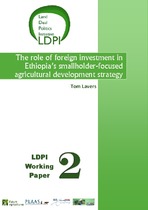The role of foreign investment in Ethiopia’s smallholder-focused agricultural development strategy
Abstract
Recent foreign agricultural investment in Africa has generated a great deal of interest and criticism,
with western media warning of a neo-colonial ‘land grab’.
This paper moves beyond this narrow assessment by examining the political and social dynamics of
foreign agricultural investment in Ethiopia, a country that has figured prominently in recent
debates. The paper links macro-level analysis regarding the types of projects and their role in the
Ethiopian economy to case studies of investments at the micro-level, which examine changing
patterns of land use and implications for displacement, employment and technology transfer. The
paper concludes that the expansion of foreign investment in Ethiopia is part of a government move
towards an export-led development strategy. As such, macro-benefits in terms of increased foreign
exchange earnings come at the cost of increased micro-level risks to those living near new
investments, in particular, politically marginalised pastoral populations in remote regions.

